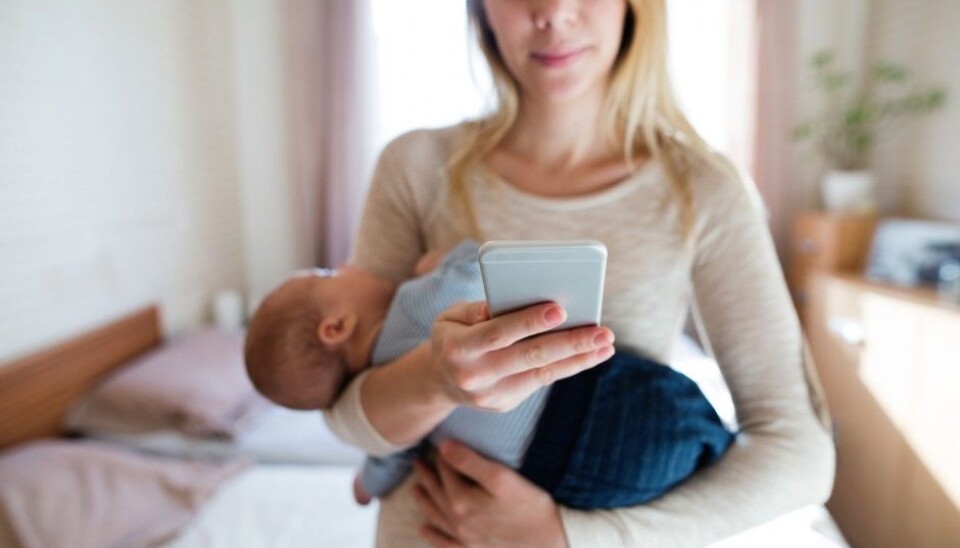This article was produced and financed by Oslo Metropolitan University

Researcher concerned: Are parents too focused on their smartphones?
Nina Misvær has five tips for parents: "Be conscious of your mobile phone use when you’re with your baby," she emphasises.
Did you know that if you keep looking at your mobile phone, it may harm your baby? Research shows that mobile phones can be stressful for babies and disturb the attachment between a parent and their child.
"If your phone is drawing your attention away from your child, it can have a negative impact on your child’s health in the long run," says Nina Misvær, researcher at Oslo and Akershus University College of Applied Sciences.
She explains that parents seem to lack knowledge of the possible harmful effects on the child.
"Face-to-face communication between parents and child is very important. Perhaps much more important than many parents are aware of," says Misvær.
Together with three public health nurses, she recently published an article on parents’ mobile phone use in the Norwegian journal Sykepleien, in which they compiled the available research on this topic.
Wants to raise the topic earlier
They emphasise that early interaction between the child and its parents is important to the child's development and attachment. When this interaction is interrupted because the child has to share its parents’ attention with a mobile phone, it can create challenges.
New national guidelines for public health centres therefore recommend that the public health nurses talk to the parents about this issue at check-ups when the child is four weeks, six months, two years and four years old.
"As public health nurses, we argue that this issue should be raised earlier and more frequently. The initial period is especially important," says Misvær.
"Experience shows that this issue should be discussed with the parents already at the home visit and frequently during the first few months of the child's life."
Talking about experience
One of the things the public health nurse talks about at the first meeting is the baby’s initiative to seek contact.
"The public health nurses talk about basic interaction factors such as eye contact, the use of voice, different facial expressions, good ways of touching, and dialogue-like communication between the child and parents," says Misvær.
The parents’ experience of their contact with their child is a good starting-point for this conversation.
"When the parents themselves put their thoughts on their mobile phone use into words, it will likely have a better effect than if the public health nurse tells them what she thinks they should do," says the researcher and adds:
"The issue of mobile phone use should be raised with the parents regularly throughout the child's first year to ensure good interaction from the start."
More knowledge needed
We do not know what constitutes too much mobile phone use.
"We know that children can handle disruptions to the interaction without any permanent damage, but extensive mobile phone use can give cause for concern since this entails more frequent and greater interruptions," Misvær emphasises.
"One example can be a child sitting in her pram on the bus who tries to establish contact with her mother because she sees a dog or some other exciting thing. But the mother is absorbed by her phone and doesn't notice anything that’s happening around them. It is important to share experiences and be present with your child."
She points out that more research is needed on parents’ mobile phone use.
"But we do know that children’s ability to regulate stress isn’t fully developed, and their stress reactions are more easily triggered than in adults."
Stress is not good in this sensitive period of the brain’s development.
"The public health nurse should encourage parents to make simple rules and establish good habits that work for them," she says.
"Some people are able to put their phone away completely while they’re with their child, and avoid the issue of how much use is too much entirely."
The researcher’s advice
Misvær emphasises five tips that parents of babies can benefit from.
- Always keep your phone in silent mode when you are actively engaged with your baby, for example during meals.
- Avoid using earplugs when you are with your baby and speaking on the phone. They make it difficult for the child to understand that you are not speaking to him.
- Put your phone in another room and make your own rules for how often you are ‘allowed’ to check it.
- Discuss the issue with your partner so that you have a common attitude to phone use while you are with your child.
- Are you conscious of how much time you spend on your phone? There are apps that map how much time you spend on your phone, and this can make you more aware.































